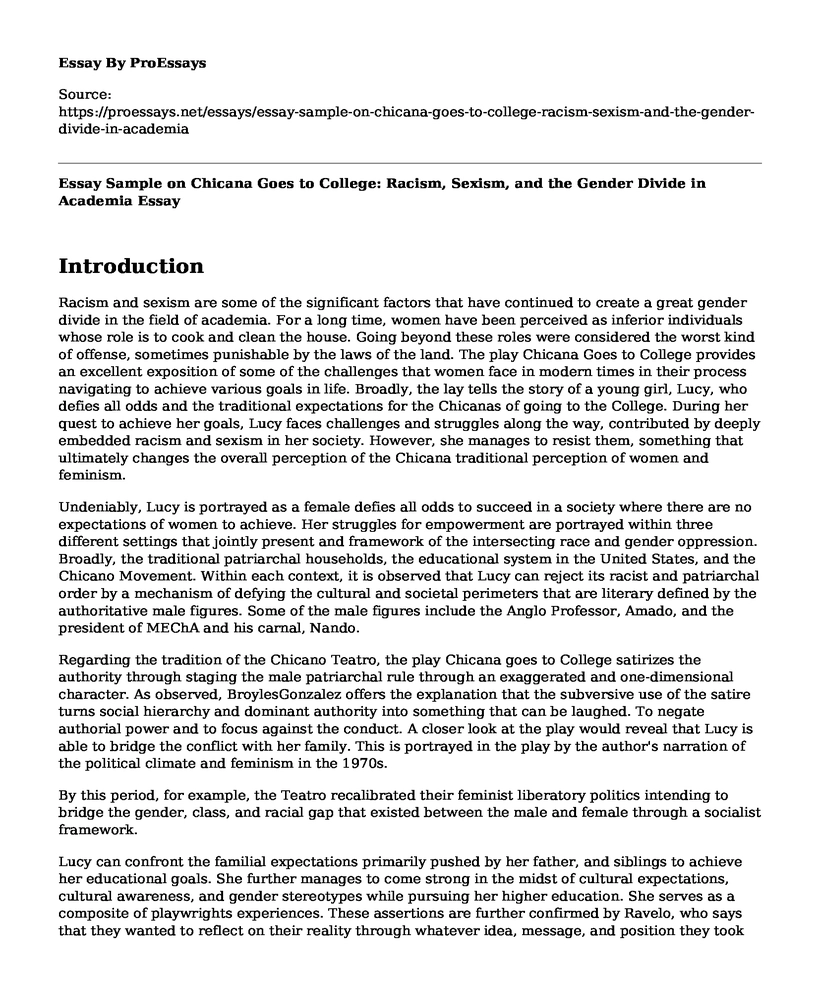Introduction
Racism and sexism are some of the significant factors that have continued to create a great gender divide in the field of academia. For a long time, women have been perceived as inferior individuals whose role is to cook and clean the house. Going beyond these roles were considered the worst kind of offense, sometimes punishable by the laws of the land. The play Chicana Goes to College provides an excellent exposition of some of the challenges that women face in modern times in their process navigating to achieve various goals in life. Broadly, the lay tells the story of a young girl, Lucy, who defies all odds and the traditional expectations for the Chicanas of going to the College. During her quest to achieve her goals, Lucy faces challenges and struggles along the way, contributed by deeply embedded racism and sexism in her society. However, she manages to resist them, something that ultimately changes the overall perception of the Chicana traditional perception of women and feminism.
Undeniably, Lucy is portrayed as a female defies all odds to succeed in a society where there are no expectations of women to achieve. Her struggles for empowerment are portrayed within three different settings that jointly present and framework of the intersecting race and gender oppression. Broadly, the traditional patriarchal households, the educational system in the United States, and the Chicano Movement. Within each context, it is observed that Lucy can reject its racist and patriarchal order by a mechanism of defying the cultural and societal perimeters that are literary defined by the authoritative male figures. Some of the male figures include the Anglo Professor, Amado, and the president of MEChA and his carnal, Nando.
Regarding the tradition of the Chicano Teatro, the play Chicana goes to College satirizes the authority through staging the male patriarchal rule through an exaggerated and one-dimensional character. As observed, BroylesGonzalez offers the explanation that the subversive use of the satire turns social hierarchy and dominant authority into something that can be laughed. To negate authorial power and to focus against the conduct. A closer look at the play would reveal that Lucy is able to bridge the conflict with her family. This is portrayed in the play by the author's narration of the political climate and feminism in the 1970s.
By this period, for example, the Teatro recalibrated their feminist liberatory politics intending to bridge the gender, class, and racial gap that existed between the male and female through a socialist framework.
Lucy can confront the familial expectations primarily pushed by her father, and siblings to achieve her educational goals. She further manages to come strong in the midst of cultural expectations, cultural awareness, and gender stereotypes while pursuing her higher education. She serves as a composite of playwrights experiences. These assertions are further confirmed by Ravelo, who says that they wanted to reflect on their reality through whatever idea, message, and position they took on stage. She also asserts that she thinks that any failure of going to school would mean killing herself. Thus, it is evident that women in the play are worried that the action's highly dialogue and exaggerated cross-dressing performances could further the generational gap through sexism and racism.
Lucy can utilize the opportunity presented through the broader Chicano Movement that created a platform through which the learned Chicanas can become educated on social and societal matters. As observed, the movement was against the cultural perceptions and beliefs that held that women were capable of more than just being kitchen managers, cleaning, and filing paperwork. Thus, the movement was focused on improving the statuses of the women in the academia, in addition to enhancing their working conditions, and elimination of the stereotyping of women as sex objects.
Conclusion
In summary, the play offers an excellent exposition of the struggles that Chicano women undergo in their quest to quench their thirst for education. The women of Teatro Chicana fought for their rights of the immigrant workers, better educational opportunities for minorities, and other class rights. Ironically, the quest to pursue higher education within this society is perceived as a highly rebellious act, from the perspective of the society members. The Chicano goes to school is therefore portrayed as a play organized by a group of the Chicanas to get a platform to air their grievances and address the struggles that minority women underwent during the process of earning their degrees. Further, it was an opportunity for them to create a common platform through which all mothers and daughters would be united to address the issues that Chicana women faced in academia, such as sexual inequality. Lucy manages to proceed to pursue her higher education through a massive struggle amid the cultural oppression, sexual pressures from the male patriarchs.
Works Cited
Garcia, Laura E., Sandra M. Gutierrez, and Felicitas Nunez. Teatro chicana: A collective memoir and selected plays. University of Texas Press, 2008.
Cite this page
Essay Sample on Chicana Goes to College: Racism, Sexism, and the Gender Divide in Academia. (2023, Apr 23). Retrieved from https://proessays.net/essays/essay-sample-on-chicana-goes-to-college-racism-sexism-and-the-gender-divide-in-academia
If you are the original author of this essay and no longer wish to have it published on the ProEssays website, please click below to request its removal:
- Three Worst Types of Students Essay
- The Partnership of AFL and La Trobe University - Paper Example
- Teaching in Different Countries Essay
- Essay Sample on Evaluating Effects of State Takeover on Teachers & Students
- Essay Example on Focus2: Online Career Planning & Self-Assessment Tool for College Students
- Essay Example on Asthma Management in Children: Home & Medical Collaboration
- Essay Example on Educating Women & Girls: How it Impacts Children's Health







